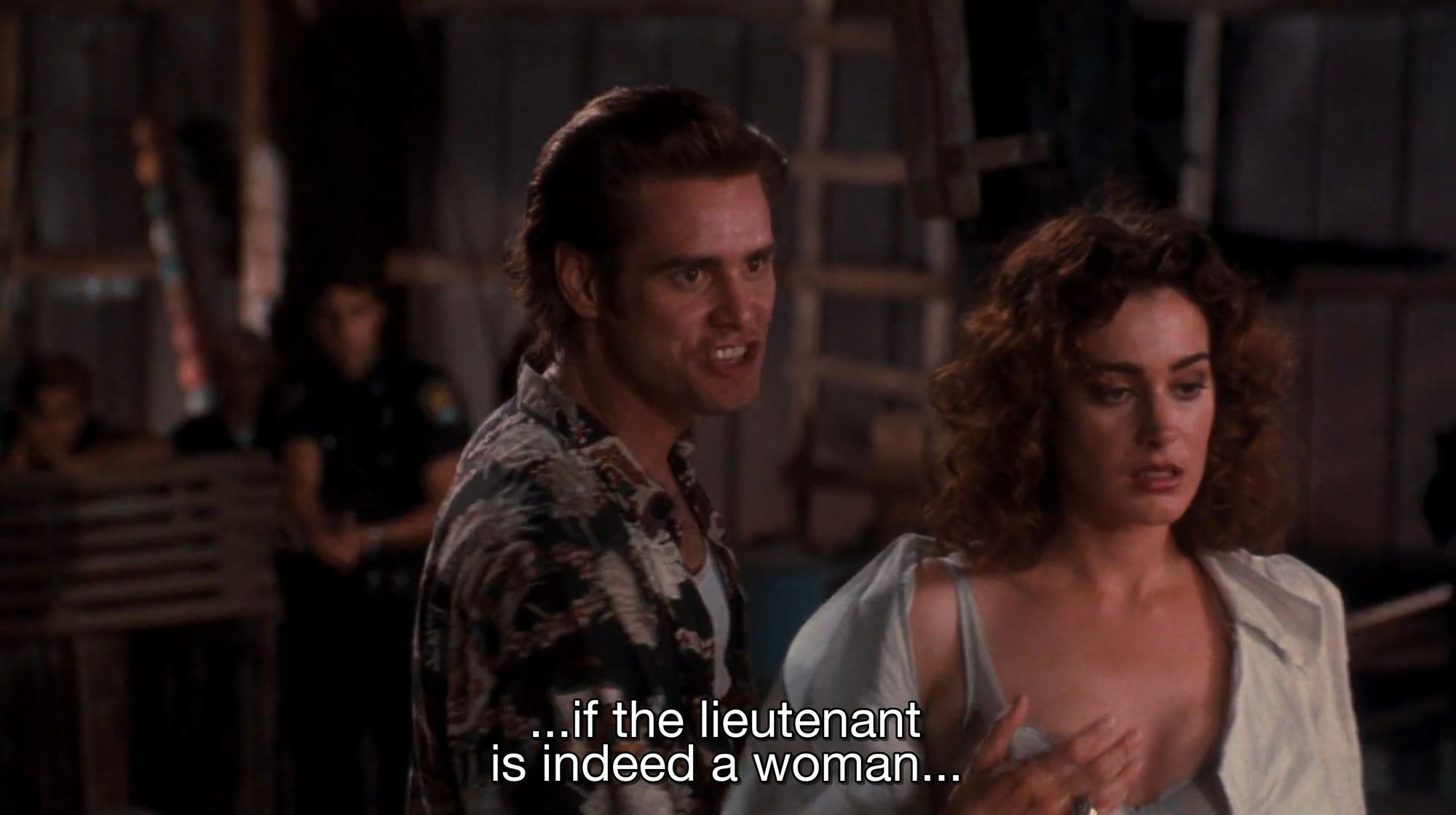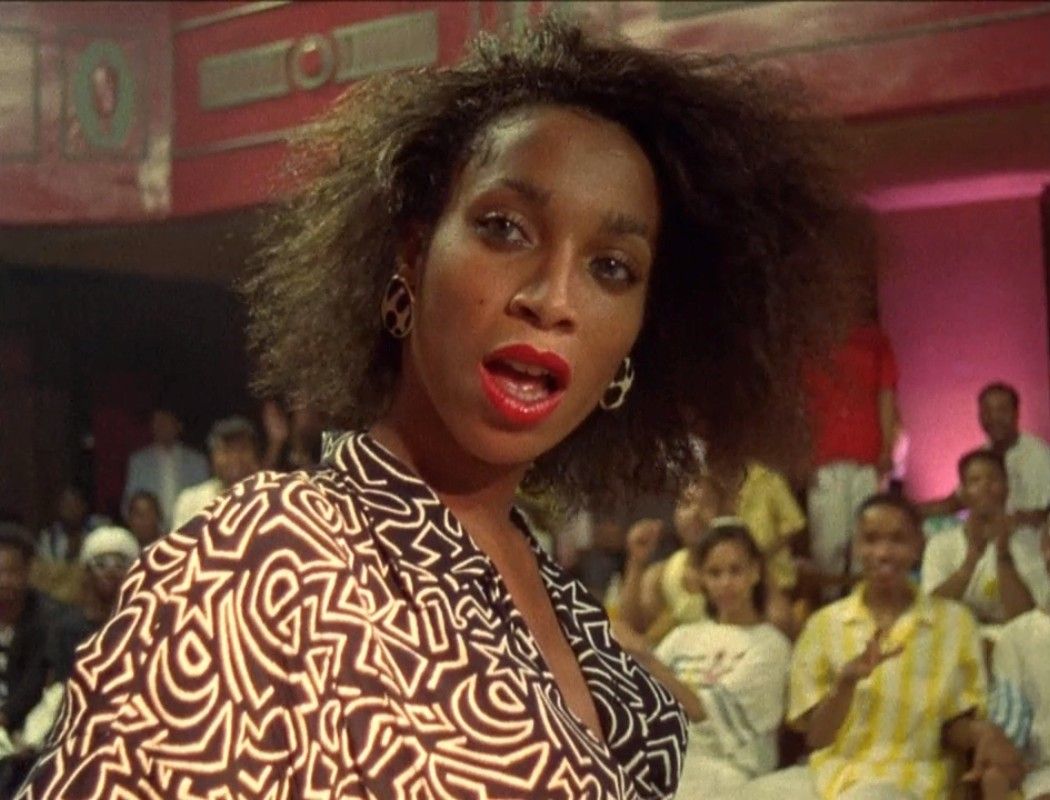How I Grew Up Transphobic (With Ace Ventura)
Hating trans people was popular culture just a generation ago

Growing up in the 1990s I remember watching Ace Ventura: Pet Detective in the theatres. I sat there with hundreds of people, munching popcorn, watching a hate crime. Millions of people did. It was a popular movie.
In the final scene, Jim Carrey has the villain surrounded by cops and he starts ripping off her clothes. The big punchline, the most terrible crime, is that she's trans. Her body is so disgusting that all the cis-men (holding guns) vomit. And we all laughed. We all watched that hate crime and laughed at it together. Today I am ashamed.
It's easy to forget that this was just a generation ago. This cinematic lynching was in 1994 (10 years ago in my mind, but actually 27). The absolute bigotry of the film didn't even register at the time. This was normal. The film ends with a line of cop cars driving to the football stadium, where cis men are athletes and cis women are cheerleaders and everyone is in their proper place.
I watched this and felt good. It was a happy ending. The heterosexuals were good and trans people were dangerous, deceptive villains. This is just how we grew up. We grew up transphobic AF.
Growing Up
Growing up in the 1990s in America, I didn't have to go out of my way to be a bigot. We said 'faggot' all the time. Lesbians were a dirty joke. The entire existence of trans people was at best hilarious, at worst a justification for violence. This is all horrifying to write down, but at the time it was just normal. Being homophobic or transphobic is not some unique pathology. This was the dominant culture of the times.

It was not, however, the only culture, and certainly not the only possible one. Also in the 1990s, Paris Is Burning was released. This documentary covered the vibrant ballroom culture of the 1980s, places where no one laughed at queer or trans people but instead celebrated them. While society was telling them to sleep in the cinders, young people found fairy godmothers, shoplifted fabulous clothes, and went out to the ball. These balls were grand contests where—even if just for a night—they were cheered instead of jeered. It's a real Cinderella story.
Growing up in Columbus, Ohio I knew nothing about this, but it existed. Thus I don't want to say 'by the standards of our times' because that just erases those voices again. Trans people existed in the 1990s, and by stubbornly persisting, they have changed popular culture today. Ballroom was a small subculture, but its influence has now spread far and wide. Today we still do voguing dance moves and use phrases like "yas queen" and "throwing shade." Meanwhile no one is talking out of their butt or saying "alrighty then" (Jim Carrey's catch-phrases). Times have changed.
This leads, however, to the conflict we see today. Most young people see trans rights as human rights, but people my age and older simply did not grow up that way. We grew up laughing at the persecution of trans people, it was family fun. Some of us grew up and are ashamed, but some are still hateful and proud. The loss of the privilege to hate feels, to many people, like an oppression. And so we get continued transphobia today, just much more whiny and self-indulgent.
Transphobia Today
Today you can't just strip a trans person naked and laugh at their body. That's not funny. You can't say they're disgusting and expect everyone else to agree. You can't portray them as villains, or dangerous, at least not so openly. But make no mistake, people still think these things. Now they just express them in more subtle ways.
Instead of making vomiting noises, they just ask questions. Instead of portraying trans people as villains, they talk about public restrooms. And instead of national films we get irrational Substacks, complaining bitterly about being silenced.
The real problem, of course, is that trans and queer people refused to be silenced. Cinderella refused to stay in the cinders and went to the ball, and won the prince of public opinion. There was a culture war over the past 25 years and Paris Is Burning is winning. Trans people are still marginalized, but you can't just strip them down and laugh at them in national cinemas. That shit will, quite rightly, get cancelled. To many people who grew up in that culture this feels like a personal loss, but it really isn't, not for them. Just look at what happened to the stars of those two films.
Jim Carrey launched his career and made millions from that movie, as did Warner Bros. They did fine. They face no particular consequences today, besides a footnote on the Wikipedia page. The stars of Paris Is Burning, however, are mostly dead. My favorite person in the film was Venus Xtravaganza was murdered in 1989, before the film was even released. She was a princess of the Harlem ballrooms, but completely vulnerable on the street.
Hence I'm talking about my generation of cis-people growing up in a cultural cesspit, but it wasn't about us. We didn't pay the price. For every Ohio boy laughing at Ace Ventura and cheering on the cops, there were cops preying on trans women, or laughing around their murder scenes. For every theatre full of people laughing at trans bodies, there were people sitting in those same theatres in very real trans bodies. And that's who I think of today.
I grew up transphobic and I grew out of it, but my 'personal journey' was someone else's personal hell. They had to grow up with not just the hatred of violent people, but the casual laughter of people like me. And so I am ashamed. I must have been 12 years old, but I sat in a theatre and laughed at a woman being exposed in front of a bunch of armed men. I saw the sequel. This was the fucked up culture I grew up in and while I was learning at a leisurely pace, real people suffered and died.
I think often of how the gay friends I have came out after college, well into 2005. Things were messed up for that long, and across most communities they still desperately are. The rising power of trans people across media is really an illusion because A) they're still fighting for the basic right to exist and B) the power, the money, and the guns are still with the people who hate them. The people who dehumanize them. Who strip them down to bodies and laugh. I have stopped laughing, but I was quite casually part of the problem for many years. So many of us were ignorantly awful. Supporting trans people today is the least we can do.